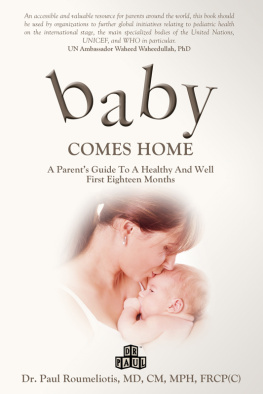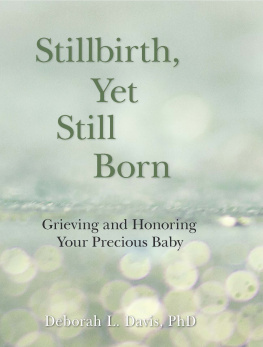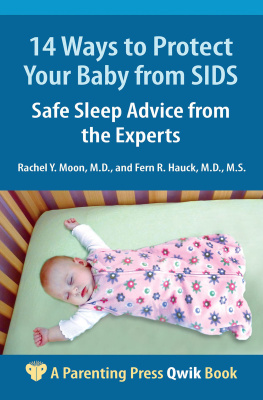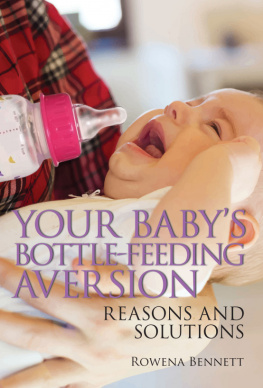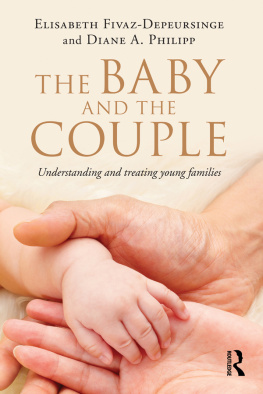
First published 1998 by Qual Institute Press
Published 2016 by Routledge
2 Park Square, Milton Park, Abingdon, Oxon OX14 4RN
711 Third Avenue, New York, NY 10017, USA
Routledge is an imprint of the Taylor & Francis Group, an iriforma business
Copyright 1998 Qyal Institute Press
All rights reserved. No part of this book may be reprinted or reproduced or utilised in any form or by any electronic, mechanical, or other means, now known or hereafter invented, including photocopying and recording, or in any information storage or retrieval system, without permission in writing from the publishers.
Notice:
Product or corporate names may be trademarks or registered trademarks, and are used only for identification and explanation without intent to infringe.
Canadian Cataloging-in-Publication Data
Martin, Karen
When a baby dies of SIDS: the parents grief and search for reason
Includes bibliographical references and indexes.
ISBN 0-9683044-3-5
1. Sudden infant death syndrome-Psychological aspects.
2. Bereavement-Psychological aspects. I. Title.
RJ320.S93M37 1998155.937085C98-900173-3
Graphic Design:Murray Pearson
Front Cover Artwork:Jill Watananiuk
Back Cover Photo:Jill Watananiuk
ISBN 13:978-1-598-74286-2 (pbk)
Dedication
To all the babies stolen by SIDS and
to all their parents and brothers and sisters and grandparents
and
To Sarah who keeps teaching me about the depth of parental love.
T here are so many people to thank. I could not have done this study without their generosity, support, and love. Thank you first to the parents who participated in the study. By sharing your experiences with me, you taught me how to endure pain with dignity. You also taught me about the strength of the human spirit. I will never forget you. Thank you to the Executive of the Edmonton chapter of the Canadian Foundation for the Study of Infant Deaths (CFSID). Your support and interest in this project kept me going when the enormity of it all overwhelmed me. I feel privileged to know you and to call you friends. Thank you, too, to the members of the Board of Consultants of the CFSID for agreeing to fund this study. I know my study was unusual. Thank you for seeing its merit and going out on a limb to fund it.
Thank you to the original members of my committee: Dr. Larson, Dr. Kent, and Dr. Morse. You each gave me something special. Thank you, Dr. Larson, for your ongoing support and respect for my work; thank you, Dr. Kent, for your inspiring enthusiasm and excitement about my findings; and thank you, Dr. Morse, for your intellectual challenges, for sharing your knowledge about qualitative research, and for your continued interest in my work. Thank you also to Dr. Peggy Anne Field who took Dr. Morses place when she moved to another university. I appreciate your input and your willingness to be involved so late in the process. Thank you also to Dr. Judith Golec, my current supervisor, for believing in me and the merits of this research.
A special thank you to my family, particularly my husband who held me while I cried my way through this study, talked with me about what I was learning, and believed in me enough to encourage me to attend university in the first place. Thank you also to all the members of my family and my friends for understanding my obsession with this project and for doing what you could to help me survive it.
E ver since I began my training as a psychiatric nurse in the late 60s, I have been trying to understand why traumatic events such as deaths, 1 J major illnesses, and relationship difficulties seem to devastate some people and strengthen other people. This question has followed me over the years as I worked in mental hospitals, general hospitals, nursing homes, group homes, community treatment centers, and mental health clinics and as I worked with the mentally ill, mentally challenged young adults, emotionally troubled youths, physically ill women, adults seeking a divorce or dealing with depression, and, finally, with people who were grieving. I began working with the bereaved while serving as the Family Development Coordinator for the Family Service Association of Edmonton (now called the Family Centre) in the late 70s. In response to requests from people who were grieving and had nowhere to turn for support, I established a bereavement support program at the agency. Litde did I know what effect it would have on my life.
Some of the people who came to the grief support groups were parents. Being a parent myself, my heart went out to these parents who had lost a child to stillbirth, a neonatal condition, accidents, illnesses, and suicide. Each loss was unique and devastating in its own way, and yet somehow these parents managed to get up every morning and, most days, to find a reason to go on with their lives. I could not understand how they managed to do this. To answer this question, I began to read all I could about grieving. In the course of my reading, I discovered an article by Cornwell, Nurcombe, and Stevens (1977), who described the grief experiences of Australian parents who had lost babies to Sudden Infant Death Syndrome (SIDS), something with which I was not familiar. On top of dealing with their grief, these parents were dealing with the fact that no one knew why their babies had died of SIDS. I wondered how these parents managed to survive this tragedy and whether any parents were strengthened by such a devastating loss. This question accompanied me to university, where I took every opportunity to explore it in the research papers I wrote as an undergraduate student in home economics. Even before I began my course work in the Masters program in sociology, I knew what my thesis topic would be. I just had to understand how parents who lost a baby to SIDS survive. I knew that the only way I could do that would be to talk with those who had lived this experience. I am pleased to finally have the opportunity to share what I learned.
Before getting into the study itself, I would like to describe what it was like for me to do this research. Although it took me a while to realize this, I eventually discovered that my research experience paralleled, to some degree, the parents grief experience. Like the parents who tried to rush their grief, I tried to rush the research process. Like the parents who had to learn that grief takes its own time, I had to learn that this kind of research cannot be rushed. Eventually, I learned to let my understanding unfold naturally rather than trying to force it.
The parents journey into grief began when they conceived, delivered, and loved their new baby for without love and attachment there can be no grief. My journey began when I decided to do the study; I felt enthusiastic about what lay ahead. Like the parents who discovered that their baby required constant attention, I soon found that the study crowded into my personal life. I walked, talked, and slept with the study. In short, I became so obsessed with it that I set aside positive and distracting interests and relationships. Soon I felt overwhelmed. At first I thought it was because I had so much information to analyze. While it was true that it took some time to learn how to manage the interview data effectively, this was not the real problem. My problem was the emotional content of the interviews. The pain behind the words on the tapes and pages of transcripts soon began to overwhelm me.


